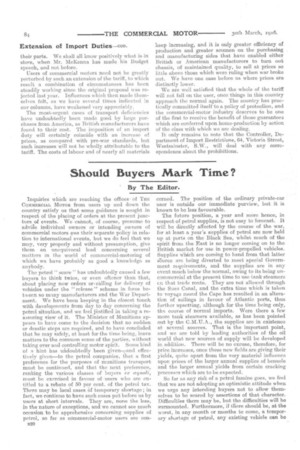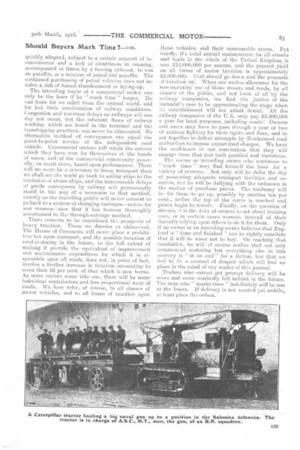Should Buyers Mark Time?
Page 2

Page 3

If you've noticed an error in this article please click here to report it so we can fix it.
By The Editor.
Inquiries which are reaching the offices • of THE COMMERCIAL MOTOR from users up and down the country satisfy us that some guidance is sought in respect of the placing of orders at the present juncture of events. We cannot, of course, presume to aclvAe individual owners or intending owners of commercial motors qua their separate policy in relation to international events, but we do feel that we may, very properly and without presumption, give them an unequivocal lead concerning several matters in the world of commercial-motoring of which we have probably as good a knowledge as anybody.
The petrol " scare" has undoubtedly caused a few buyers to think twice, or even oftener than that, about placing new orders or calling for delivery of vehicles under the " release " scheme in force between so many manufacturers and the War Department. We have been keeping in the closest touch with developments from day to day concerning the petrol situation, and we feel jUstified in taking a reassuring view of it. The Minister of Munitions appears to have come to the decision that no sudden or drastic steps are required, and to have concinded that he may safely, at least for the time being, leave matters to the common sense of the parties, without taking over and controlling motor spirit. Some kind of a hint has undoubtedly been givenand effectively given—to the petrol companies, that a first preference for the purposes of munitions transport must be continued, and that the next preference., ranking the various classes of buyers ex aquali, must be exercised in favour of users who are entitled to a rebate of 50 Per cent. Of the petrol tax. There may be local cases Of temporary shortage ; in fact, we continue to have such cases put before us by users at short intervals. they are, none the less, in the nature of exceptions, and we cannot see much occasion to be apprehensive concerning supplies of petrol, so far as commercial-motor users are con B20 earned. The position of the ordinary private-car user is outside our immediate purview, but it is known to be less favourable.
The future position, a year and more hence, in respect of petrol supplies, is not easy to forecast. It will be directly affected by the course of the war, for at least a year's supplies of petrol are now held up at ports on the Black Sea, whilst much of the spirit from the East is no longer coming on to the British market for use in power-propelled vehicles. Supplies Which are coming to hand from that latter s'Ource are being diverted to meet special Government requirements, and the supplies are in any event much below the normal, owing to its being uncommercial at the present time to use tank steamers Cu that trade route. They are not allowed through the Suez Canal, and the extra time which is taken to voyage round the Cape has resulted in an alteration of sailings in favour of Atlantic ports, thus further upsetting, although for the time being only, the: course of normal imports. Were there a few more tank steamers available, as has been pointed out by the C.M.U.A., the supplies are in existence at several sources. That is the important point, and we are told by leading authorities of the oil world that new sources of supply will be developed in addition. There will be no excuse, therefore, for price increases, once these new fields are giving their yields, quite apart from the very material influence upon prices of the larger annual supplies of benzole and the larger annual yields from certain cracking processes which are to be expected.
So far as any risk of a petrol famine goes, we feel that we are not adopting an optimistic attitude when we urge any intending buyers not to allow themselves to be scared by assertions of that character. Difficulties there may be, but the difficulties will be surmounted. Furthermore, if tliere should be, at the worst, in any month or months to come, a temporary shortage of petrol, any existing vehicle can be quickly adapted, subject to a certain amount of inconvenience. and a Jack of cleanliness in running, accompanied at times by a fuming exhaust, to run on paraffin, or a mixture of petrol and paraffin. The continued purchasing of petrol vehicles does not involve a risk of forced abandonment or laying-up.
The intending buyer of a commercial motor can only be the loser if he "mark time " longer. He can hope for no relief from the animal world, and for but little amelioration of railway conditions. Congestion and war-time delays on railways will one day not occur, but the inherent flaws of railway working, which are found in the terminal and the transhipping practices, can never be eliminated. No alternative method of conveyance can equal the point-to-point service of the independent road vehicle. Commercial motors will retain the esteem which they have won for themselves at the hands of users, and of the commercial coMmunity generally, on merit alone, based upon performance. There will no mere be a reversion to horse transport than we shall see the world go back to sailing ships to the exclusion of steam ships, and the innumerable delays of goods conveyance by railway will permanently stand in the way of a reversion to that method; exactly as the travelling .public will never consent to go back to a system of changing carriages—unless for war reasons—now that it has become thoroughly accustomed to the through-carriage method.
There remains to be considered the prospects of heavy taxation. These we dismiss as chimerical. The House of Commons will never place a prohibitive tax upon transport, and the possible taxation of road-motoring in the future, to the full extent of making it provide the equivalent of improvement and maintenance expenditure for which it is responsible upon all roads, does not, in point of fact, involve a further increase in taxation amounting to more than 33 per cent, of that which is now borne. As more motors come into use, there will be more individual contributors and less proportional wear of roads. We here refer, of course, to all classes of motor vehicles, and to all forms of taxation upon those vehicles, and their consumable stores. Put briefly; tl:e total annual maintenance for all streets and roads iii the whole of the United Kingdom. is now ze14,000,000 per annum, and the presentyield on all forms of motor taxation is approximately 13,000,000. Cost should go down and the proceeds ef taxation up. When one makes allowance for the non-motorine use of those. streets and roads, by all classes of the public, and not. least of. all by the railway 'companies, -we find the justice of the motorist's ease to be approximating the stage when its establishment will not admit denial. All the railway companies of the U.K.. only pay 15,300,000 a. year for local purposes, inclUding roads! Owners and users may have to pass through a year or two of anxious fighting for their rights and dues, and to act together to defeat attempts by ill-informed road authorities to impose unjust road charges. We have the confidence of our Convictions that they will emerge from that test. both justified and victorious.
The owner or -intending owner who continues to " mark time" may .find himself the loser for a variety of reasons. Not only Wilhhe defer the day of possessing adequate transport facilities and .re-serves, but he will be dallying with the unknown in the matter of purchase prices. The tendency Will be for these to go .up, possibly by another ten per cent., before the top_ of the. curve is.. reached and prices begin to recede, Finally, on the question. of drivers, it is the duty of owners to set about training men, or in certain eases women, -instead of their flaccidly relying upon others to do it for them. Only it an owner or an intending owner believes that England is" done and finished" can he rightly conclude that it will be wiser not to buy.: On reaching that conclusion, he will of course realize that not only commercial motoring but everything else, in this country is " at an end'' for a Briton, but that we feel to be a counsel of despair which will find no place in the mind of any reader of this journal.
Traders who cannot get prompt delivery will be more and more markedly left behind in the future. The man who ' marks time " indefinitely will be one of the losers. If delivery is not wanted yet awhile, at least place the orders.






















